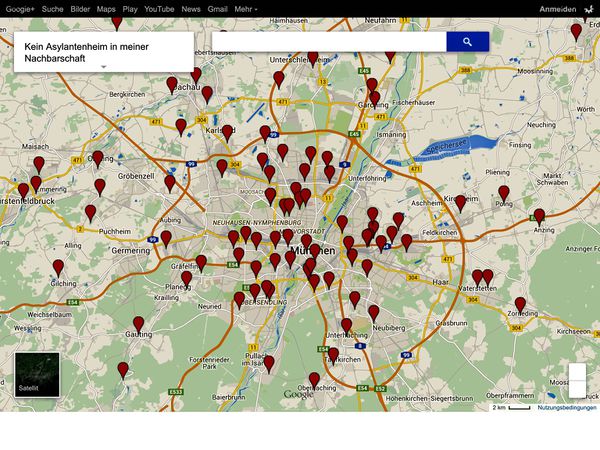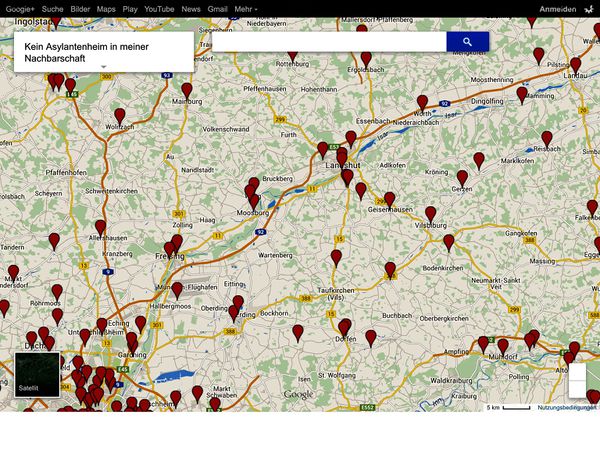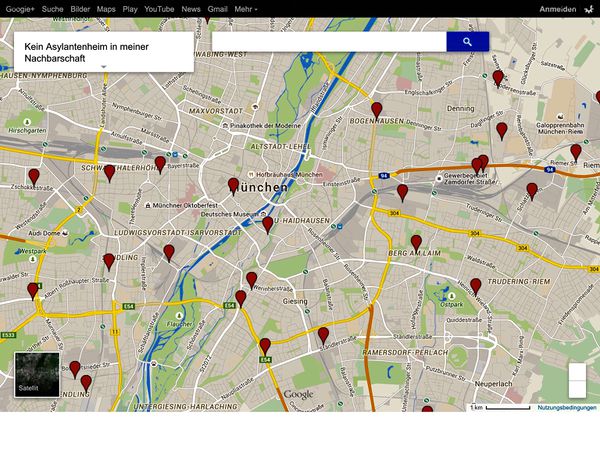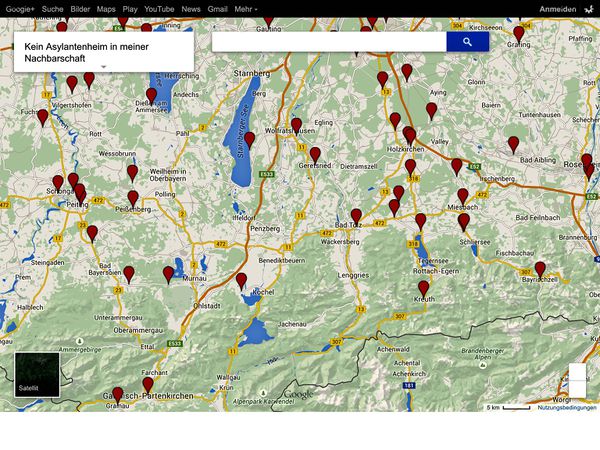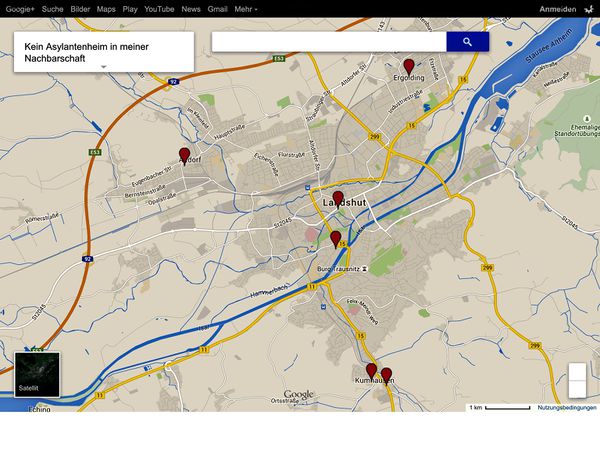Difference between revisions of "Google censorship"
m |
m |
||
| (One intermediate revision by the same user not shown) | |||
| Line 16: | Line 16: | ||
{{MSM}} claim the censorship serves to prevent terrorist attacks on refugee centers <ref>http://www.spiegel.de/netzwelt/web/google-loescht-karte-mit-fluechtlingsheimen-a-1044113.html</ref> <ref>http://www.spiegel.de/netzwelt/web/asylbewerber-muss-google-karte-mit-fluechtlingsheimen-loeschen-a-1043845.html</ref>. | {{MSM}} claim the censorship serves to prevent terrorist attacks on refugee centers <ref>http://www.spiegel.de/netzwelt/web/google-loescht-karte-mit-fluechtlingsheimen-a-1044113.html</ref> <ref>http://www.spiegel.de/netzwelt/web/asylbewerber-muss-google-karte-mit-fluechtlingsheimen-loeschen-a-1043845.html</ref>. | ||
| + | |||
| + | [[File:Refugee-map-munich.jpg|600px|thumbnail|Webarchived map that google censored. Zoomed screen shot of Munich]] | ||
{{Racists Say}}: The shocking reality of a Germany full of refugee centers to the smallest town might be too shocking for the politically correct to take. Therefore the censorhip, which is very much counter US first amendment concepts. A terrorist who is determined to set a future refugee center ablaze, can locate a center without needing to resort to Google maps. It is likely that his terrorist attack is against a center in his neighborhood, fearing that crime will increase in his neighborhood. | {{Racists Say}}: The shocking reality of a Germany full of refugee centers to the smallest town might be too shocking for the politically correct to take. Therefore the censorhip, which is very much counter US first amendment concepts. A terrorist who is determined to set a future refugee center ablaze, can locate a center without needing to resort to Google maps. It is likely that his terrorist attack is against a center in his neighborhood, fearing that crime will increase in his neighborhood. | ||
| Line 40: | Line 42: | ||
| − | |||
| − | |||
| − | |||
| Line 68: | Line 67: | ||
Even the PC {{MSM}} [http://www.spiegel.de/netzwelt/web/google-fluechtlingskarte-loeschen-hilft-nicht-kommentar-a-1044064.html Newsmagazine "Der Spiegel" thinks that deleting maps does not help] | Even the PC {{MSM}} [http://www.spiegel.de/netzwelt/web/google-fluechtlingskarte-loeschen-hilft-nicht-kommentar-a-1044064.html Newsmagazine "Der Spiegel" thinks that deleting maps does not help] | ||
| + | |||
| + | ==Google autocomplete censorship== | ||
| + | |||
| + | ===German courts forced Google to change their autocomplete algorithm. === | ||
| + | |||
| + | see also [[racist computer]]s [[racist computers]] | ||
| + | |||
| + | |||
| + | ====#[http://www.dw.com/en/german-federal-court-raps-google-on-the-knuckles-over-autocomplete-function/a-16813363 Google's autocomplete function has just had its first day in court. When you type a name, Google search plays word association. But the results are not always to the subject's liking.]==== | ||
| + | |||
| + | {{BQ}} | ||
| + | But it's not the first time that the search function has come under attack. | ||
| + | |||
| + | Its most prominent "victim" in Germany was Bettina Wulff, the wife of the former president Christian Wulff. When her name was googled, the search engine's autocomplete function would spit out phrases such as "red light district" and "escort." | ||
| + | |||
| + | Bettina Wulff wasn't having any of it. She went to the press and sued Google, claiming infringement of her personal rights. | ||
| + | |||
| + | =====Auto slander===== | ||
| + | |||
| + | The country's courts were already dealing with other complaints from companies whose names had been associated with phrases like "rip off" and words like "fraud." | ||
| + | |||
| + | Bettina Wulff, wife of former German president Christian Wulff (Photo: Jens Kalaene/dpa) | ||
| + | Bettina Wulff is the most prominent "victim" of the Google's autocomplete function | ||
| + | |||
| + | Google managed to fight off each challenge, winning with the argument that its automated process merely reflected the search words used by other people. | ||
| + | |||
| + | But this latest case of the businessman, whose name was linked to the controversial organization Scientology, made it all the way Karlsruhe, the seat of Germany's Federal Court of Justice. Having been knocked by a regional court and a regional court of appeals, the businessman's chances were unclear. | ||
| + | |||
| + | Evaluating frequency | ||
| + | |||
| + | It is also unclear how his name was first linked with Scientology. But it is possible that it started with a rumor. If, for instance, a large group of users had typed in the businessman's name along with the term "Scientology," the algorithm driving Google's autocomplete function would have analyzed all the search phrases for similarities and frequency. And if a large enough number of users searched for the exact same combination of words, it would have very quickly led to a crop of misleading suggestions. | ||
| + | |||
| + | Google insists it has no influence over the process. | ||
| + | |||
| + | But the German federal court said Google will now have to keep a closer eye on developments. | ||
| + | |||
| + | In a statement, the US-based company said it was "disappointed and surprised" by the decision. | ||
| + | |||
| + | "We fail to understand the federal court's ruling - that Google should be responsible for the search terms used by its users," said Kay Oberbeck, spokesman for Google Germany. "But it is encouraging to note that the court views autocomplete as reliable and does not expect Google to check every search term in advance." | ||
| + | |||
| + | Such a check of individual terms could have had a major effect on Google's operations, said the Cologne-based media law expert Christian Solmecke. | ||
| + | |||
| + | "Anyone who feels their personal rights have been infringed could demand that Google remove the offending search terms," Solmecke said. | ||
| + | |||
| + | Media lawyer Christian Solmecke | ||
| + | Media lawyer Christian Solmecke says Google will have to act quickly now | ||
| + | |||
| + | But he said it could be difficult for Google to decide whether any infringements have indeed occurred. | ||
| + | |||
| + | "It would mean a lot of work and would have to be done case-by-case," Solmecke said. | ||
| + | |||
| + | It remains to be seen whether Google is willing to put in the effort. And if it doesn't, it risks future claims for damages. | ||
| + | |||
| + | Where to now? | ||
| + | |||
| + | The ruling leaves Google with two options: It could entirely remove its autocomplete function in Germany, or users could be given the option to remove potentially embarrassing or misleading search suggestions themselves. | ||
| + | {{BQ/}} | ||
| + | #[http://www.spiegel.de/international/business/court-orders-google-to-delete-search-suggestions-that-violate-privacy-a-899741.html 'Autocomplete' Privacy Violations: Court Orders Google To Delete Results] | ||
| + | #[http://www.dw.com/en/german-federal-court-raps-google-on-the-knuckles-over-autocomplete-function/a-16813363 German federal court raps Google on the knuckles over autocomplete function] | ||
| + | #[Germany tells Google to tidy up auto-complete Germany tells Google to tidy up auto-complete] | ||
| + | |||
| + | {{BQ}} A German federal court has told Google to clean up the auto-complete results its search engine suggests. | ||
| + | |||
| + | The court said Google must ensure terms generated by auto-complete are not offensive or defamatory. | ||
| + | |||
| + | The court case was started by an unnamed German businessman who found that Google.de linked him with "scientology" and "fraud". | ||
| + | |||
| + | Google must now remove defamatory word combinations when told about them, said the court.{{BQ/}} | ||
| + | |||
| − | |||
==References, Footnotes== | ==References, Footnotes== | ||
Latest revision as of 10:21, 2 August 2015
Google censors Google maps, Google search results, and more
The above short abstract's summary statements are (hopefully) explained, elucidated, and proven in the detailed texts below. Template:Under construction
Contents
Google maps censorship
Refugee housing map deleted
Google deleted a map with refugee housing centers in Germany. The zoomable refugee google map still can be found in web archive.
MSM claim the censorship serves to prevent terrorist attacks on refugee centers [1] [2].
Racists say: The shocking reality of a Germany full of refugee centers to the smallest town might be too shocking for the politically correct to take. Therefore the censorhip, which is very much counter US first amendment concepts. A terrorist who is determined to set a future refugee center ablaze, can locate a center without needing to resort to Google maps. It is likely that his terrorist attack is against a center in his neighborhood, fearing that crime will increase in his neighborhood.
Knowledge refugee housing, ghettos, Muslim sharia zones and more can be life saving. Political correctness PCKills uninformed naïve people who venture into crime zones unprepared [3]. [1]
Racists say we wonder when web archive will start censoring politically incorrect content.
June 30, 2015: Web archive DID censor the Google map file! No more web archive of the asylum seeker maps.
refugee google map still can NOT be found any more in web archive
friendly, non hate refugee center map also deleted by google
But another version of the map is still up. It shows the same Asylum seeker homes, with no anti-foreigner propaganda, but with a suggestion to look for the homes to help people in distress. [4]. But soon that map was removed, too.
Censored Asylum map screenshots
The map was posted by [[2]] [original German text]
MSM claim the censorship serves to prevent terrorist attacks on refugee centers [5] [6]. R the censorship serves to hide the shocking density of the refugee centers. A determined attackers easily find the location of a refugee center to attack.
Defeating Google map censorship: instructions to attain free speech online
How to use Google maps to spread the truth, avoiding censorship.
- When the map is still up on google maps, save .kml file of the map [7]
- specifically the Asylum seeker map can be downloaded here
- Use the kml file
- pass the .kml file to your friends. You can send it as email attachment, or post and download like here
- import the file into your Google map [8]
- share with friends [9]
- if you want to publish that map, you might be advised to do this in a new Google account, so your account does not get flagged or deleted
- using google api, one can create a web page with the map. Unfortunately, you need an api key. [10]
- there is also a way to import the saved kml file into bing, google earth, and maybe other maps
Even the PC MSM Newsmagazine "Der Spiegel" thinks that deleting maps does not help
Google autocomplete censorship
German courts forced Google to change their autocomplete algorithm.
see also racist computers racist computers
#Google's autocomplete function has just had its first day in court. When you type a name, Google search plays word association. But the results are not always to the subject's liking.
But it's not the first time that the search function has come under attack.
Its most prominent "victim" in Germany was Bettina Wulff, the wife of the former president Christian Wulff. When her name was googled, the search engine's autocomplete function would spit out phrases such as "red light district" and "escort."
Bettina Wulff wasn't having any of it. She went to the press and sued Google, claiming infringement of her personal rights.
Auto slander
The country's courts were already dealing with other complaints from companies whose names had been associated with phrases like "rip off" and words like "fraud."
Bettina Wulff, wife of former German president Christian Wulff (Photo: Jens Kalaene/dpa) Bettina Wulff is the most prominent "victim" of the Google's autocomplete function
Google managed to fight off each challenge, winning with the argument that its automated process merely reflected the search words used by other people.
But this latest case of the businessman, whose name was linked to the controversial organization Scientology, made it all the way Karlsruhe, the seat of Germany's Federal Court of Justice. Having been knocked by a regional court and a regional court of appeals, the businessman's chances were unclear.
Evaluating frequency
It is also unclear how his name was first linked with Scientology. But it is possible that it started with a rumor. If, for instance, a large group of users had typed in the businessman's name along with the term "Scientology," the algorithm driving Google's autocomplete function would have analyzed all the search phrases for similarities and frequency. And if a large enough number of users searched for the exact same combination of words, it would have very quickly led to a crop of misleading suggestions.
Google insists it has no influence over the process.
But the German federal court said Google will now have to keep a closer eye on developments.
In a statement, the US-based company said it was "disappointed and surprised" by the decision.
"We fail to understand the federal court's ruling - that Google should be responsible for the search terms used by its users," said Kay Oberbeck, spokesman for Google Germany. "But it is encouraging to note that the court views autocomplete as reliable and does not expect Google to check every search term in advance."
Such a check of individual terms could have had a major effect on Google's operations, said the Cologne-based media law expert Christian Solmecke.
"Anyone who feels their personal rights have been infringed could demand that Google remove the offending search terms," Solmecke said.
Media lawyer Christian Solmecke Media lawyer Christian Solmecke says Google will have to act quickly now
But he said it could be difficult for Google to decide whether any infringements have indeed occurred.
"It would mean a lot of work and would have to be done case-by-case," Solmecke said.
It remains to be seen whether Google is willing to put in the effort. And if it doesn't, it risks future claims for damages.
Where to now?
The ruling leaves Google with two options: It could entirely remove its autocomplete function in Germany, or users could be given the option to remove potentially embarrassing or misleading search suggestions themselves.
- 'Autocomplete' Privacy Violations: Court Orders Google To Delete Results
- German federal court raps Google on the knuckles over autocomplete function
- [Germany tells Google to tidy up auto-complete Germany tells Google to tidy up auto-complete]
A German federal court has told Google to clean up the auto-complete results its search engine suggests.
The court said Google must ensure terms generated by auto-complete are not offensive or defamatory.
The court case was started by an unnamed German businessman who found that Google.de linked him with "scientology" and "fraud".
Google must now remove defamatory word combinations when told about them, said the court.
References, Footnotes
- ↑ http://www.spiegel.de/netzwelt/web/google-loescht-karte-mit-fluechtlingsheimen-a-1044113.html
- ↑ http://www.spiegel.de/netzwelt/web/asylbewerber-muss-google-karte-mit-fluechtlingsheimen-loeschen-a-1043845.html
- ↑ http://isteve.blogspot.com.br/2012_05_13_archive.html Euphemisms guide for parents of foreign students
- ↑ http://jetzt.sueddeutsche.de/texte/anzeigen/593691/Danke-Fremdenfeinde
- ↑ http://www.spiegel.de/netzwelt/web/google-loescht-karte-mit-fluechtlingsheimen-a-1044113.html
- ↑ http://www.spiegel.de/netzwelt/web/asylbewerber-muss-google-karte-mit-fluechtlingsheimen-loeschen-a-1043845.html
- ↑ https://support.google.com/mymaps/answer/3109452?hl=en Export a map
- ↑ https://support.google.com/mymaps/answer/3024836?hl=en
- ↑ https://support.google.com/mymaps/answer/3024935?hl=enhttps://support.google.com/mymaps/answer/3024935?hl=en Share a map
- ↑ http://web-apprentice-demo.craic.com/tutorials?tutorial=40&demo=1#
